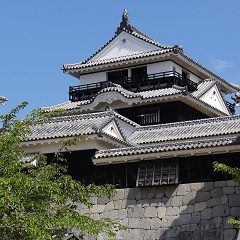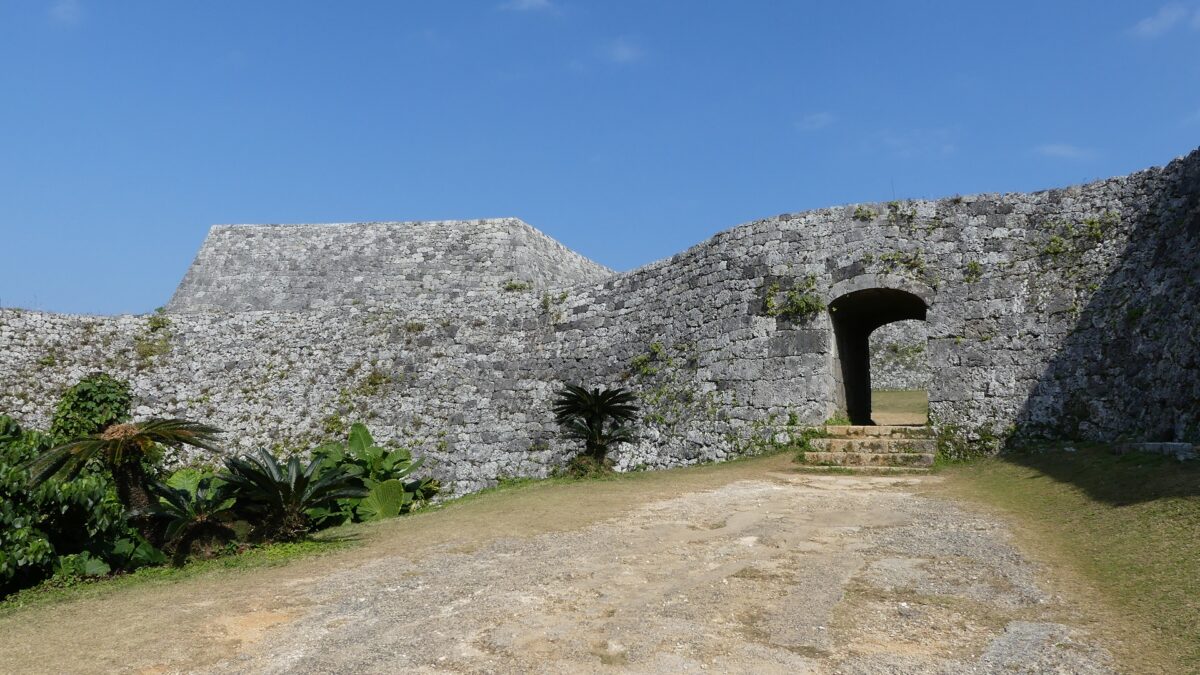立地と歴史~Location and History
護佐丸が作った~Gosamaru built it
座喜味城は、琉球諸島(現在の沖縄諸島)周辺に300以上築かれた「グスク」を呼ばれた大規模な要塞の一つです。沖縄本島西海岸の近く、高さ120mの丘の上に築かれました。そのため、この城は非常に戦略的な位置にあり、この島と海を広範囲に見渡すことができます。また、この城は誰がいつ築いたのか明確である数少ないグスクの一つなのです。
Zakimi Castle was one of the over 300 large-scale fortresses called “Gusuku” around the Ryukyu Islands (what is now Okinawa Islands). It was located on a 120m high hill near the western coast of the mid Okinawa Island. That’s why the castle had a very strategic location where wide views of the island and sea can be seen. It is also one of the few Gusuku which people know when and who built it.
「按司」と呼ばれた有力な領主の一人、護佐丸が15世紀初頭に最初にこの城を築きました。それ以前は、彼は別のグスク、山田城に住んでおり、後の琉球王国となる中山王国に仕えていました。1416年、中山王国が北山王国を倒した時、彼は多大な貢献をしました。その後、彼は北山(沖縄本島北部)守護職に任命されました。一方彼は新しい本拠地として座喜味城の築城を始めたのです。
One of the powerful lords called “Aji”, Gosamaru first built the castle in the first 15th century. Before that, he lived in another Gusuku called Yamada Castle, and worked under the Chuzan Kingdom, the later Ryukyu Kingdom. He made a significant contribution when the Chuzan Kingdom beat the Hokuzan Kingdom in 1416. After that, he was appointed as the military governor of the Hokuzan Region (the northern part of Okinawa Island), while he started to build Zakimi Castle as his new home base.
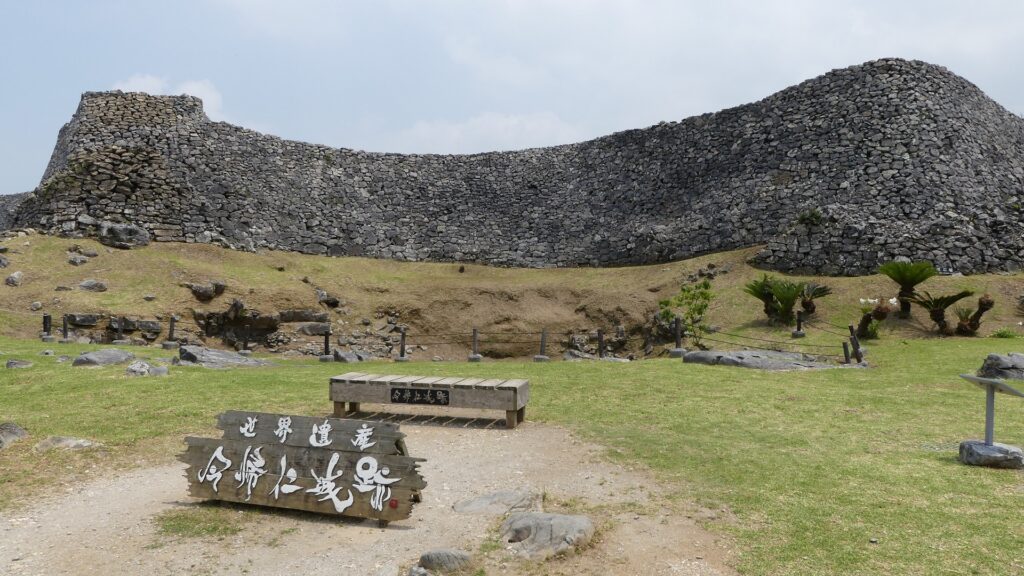
護佐丸名を揚げる~Gosamaru made his mark
この城の下にある丘は、岩盤ではなく軟弱な地盤でした。しかし護佐丸は、美しい高石垣を伴う強力な城を築くことに成功したのです。この工事により、彼は勇猛な将軍としてだけではなく、優れた築城家としても知られるようになりました。彼は1422年にこの城に移り、18年間在城しました。貿易の統制を含め、この城の周辺地域を支配していました。
The hill under the castle was soft ground, not rocky, but Gosamaru succeeded in building a strong castle with beautiful, high stone walls. This construction made him a great castle builder as well as a brave general. He lived in Zakimi Castle for 18 years since moving to it in 1422. He governed the area around the castle, while controlling the trading near the castle.
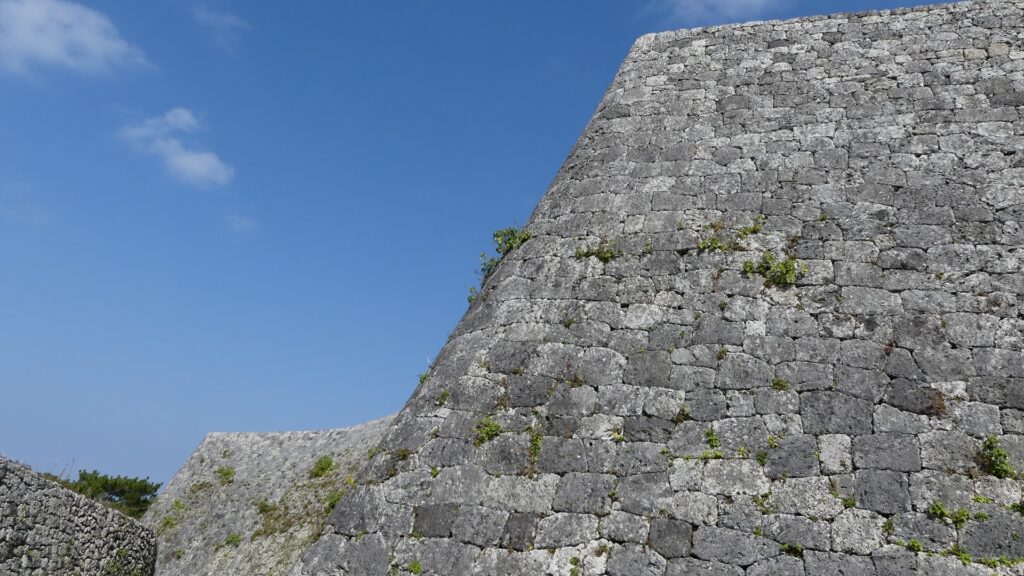
1440年、琉球王国は護佐丸に対して、座喜味城の東にある中城城に移るよう命じました。王国に対抗して力をつけていた別の有力按司、阿麻和利が島の東海岸にある勝連城にあったからです。護佐丸は、現在我々が素晴らしい城跡として見ているように、中城城をも改築したのです。彼はまた、王国の親戚筋にもなり、緊密に連携していました。
In 1440, the king of Ryukyu Kingdom ordered Gosamaru to move to Nakagusuku Castle, located east of Zakimi Castle, as another great Aji, Amawari, who lived in Katsuren Castle located in the eastern coast of the island, grew in strength against the Kingdom. Gosamaru also improved Nakagusuku Castle like we can now see the great ruins of the castle. He also became a relative of the Kingdom to work closely with it.
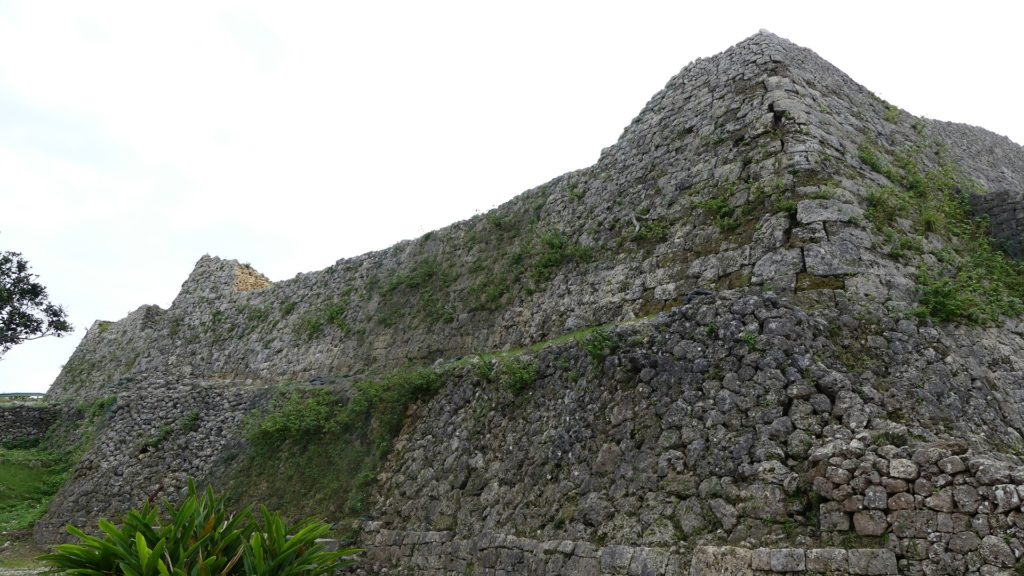
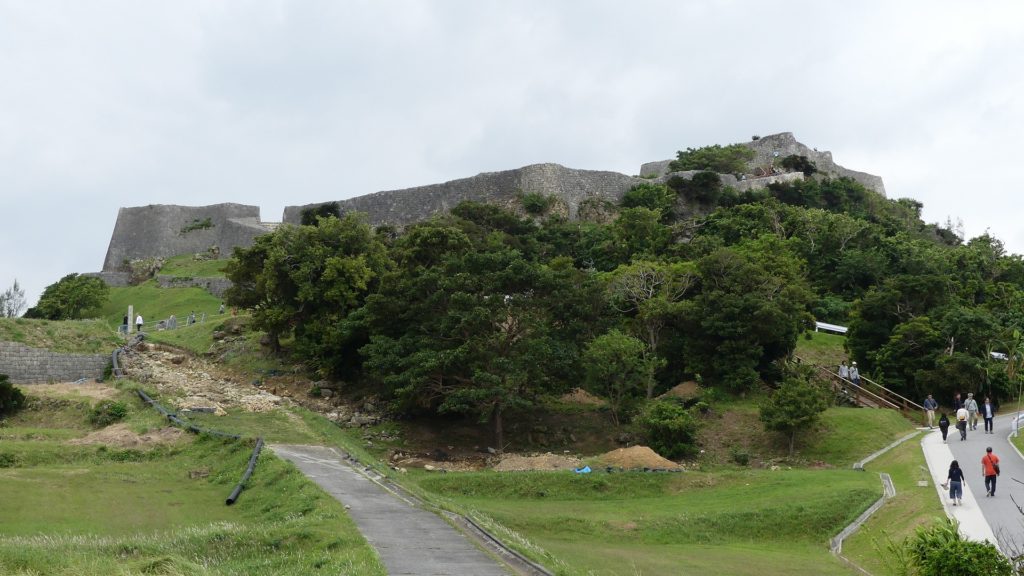
護佐丸非命に倒れる~Gosamaru dies unnatural death
ところが、護佐丸は王国への反逆者とみなされてしまい、1458年に阿麻和利によって滅ぼされてしまいます。阿麻和利から攻撃されたとき、護佐丸は自身への疑いのことを聞き、嘆き悲しんで、阿麻和利と戦うことなく自ら命を絶ったといいます。阿麻和利が王国と護佐丸を騙したのだと言われていますが、詳細は不明です。発掘によれば、護佐丸が去った後の座喜味城は、16世紀まで使われたとのことです。
However, Gosamaru was considered a rebel against the Kingdom, and beaten by Amawari in 1458. When Amawari attacked, Gosamaru heard the doubt about him, felt very sad, and killed himself without fighting with Amawari. It is said that Amawari deceived the Kingdom and Gosamaru, but the details are uncertain. Zakimi Castle after Gosamaru left, was used until the 16th century, according to the excavation.
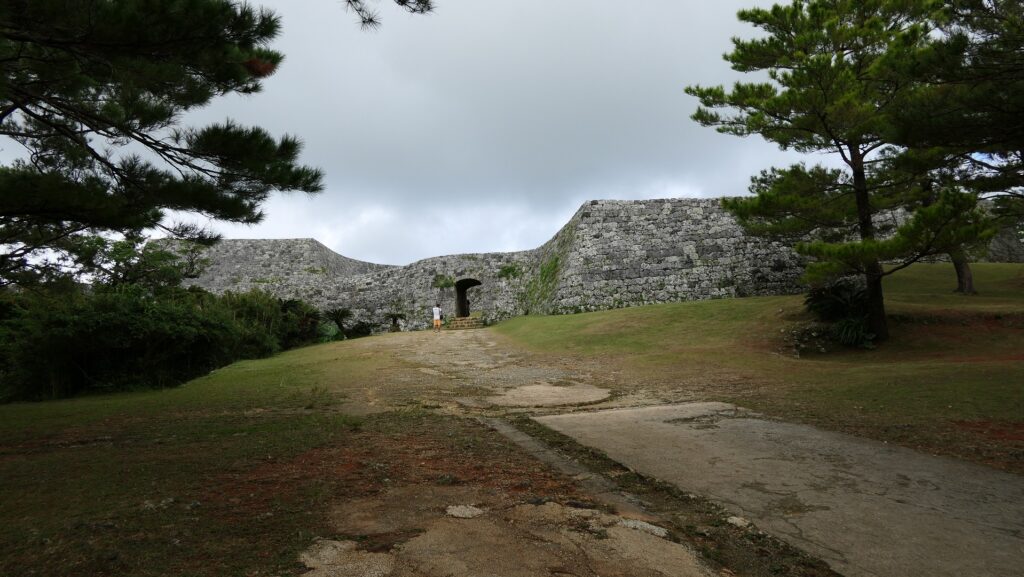
特徴~Features
石垣の特徴~Features of stone walls
現在、座喜味城跡はよく整備され、また維持されています。この城にはもともと2つの曲輪しかなかったので、場所自体はそんなに広くありません。主には石垣が残っていますが、最高で13mの高さがあり、とても美しく見えます。曲線を描く石垣が、頂点部分でつながり、扇状に広がっています。このような形状は、軟弱な地盤を補い、頂点の部分は見張りや防御地点として使われたと言われています。それぞれの曲輪にはアーチ型の門があり、他の石をつなぎ合わせるために楔形の石が使われています。この方法は珍しい方法で、このため沖縄のグスクの中では、座喜味城の門は最も初期段階のアーチ門であると考えられています。
Now, the ruins of Zakimi Castle are well developed and maintained. The site is not so large, because the castle originally had just two enclosures. The stone walls mainly remain and look very beautiful with at highest 13m height. They are curved walls jointed by their apexes, spreading fan-wise. It is said that such a shape can cover the soft ground, and the apexes could be used as the points for monitoring and protecting. Each enclosure has an arch-shaped gate which uses a keystone connecting other stones. It is a unique method and Zakimi castle gates are thought to be the first case for arch-shaped gates among Okinawa’s Gusuku.
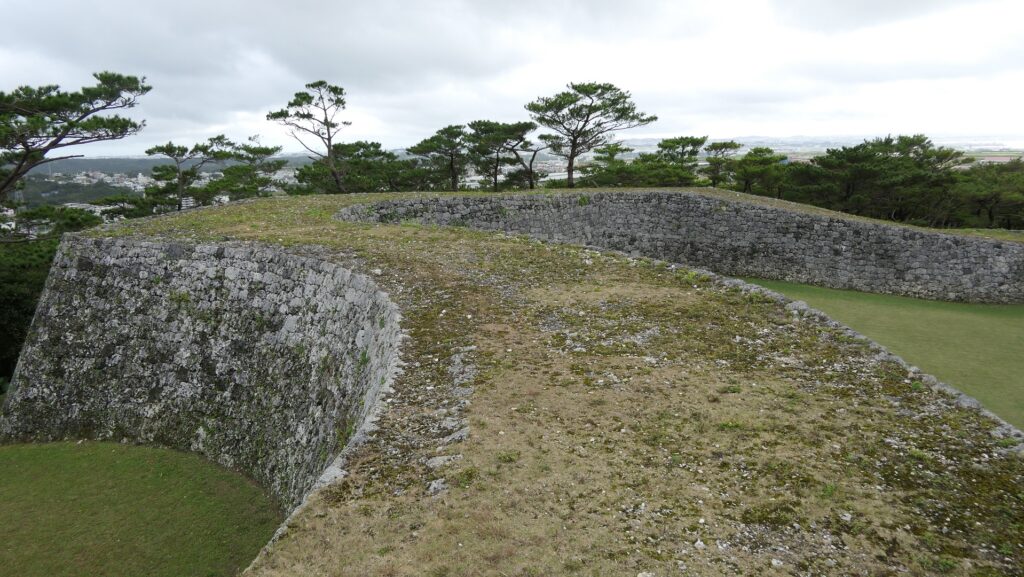
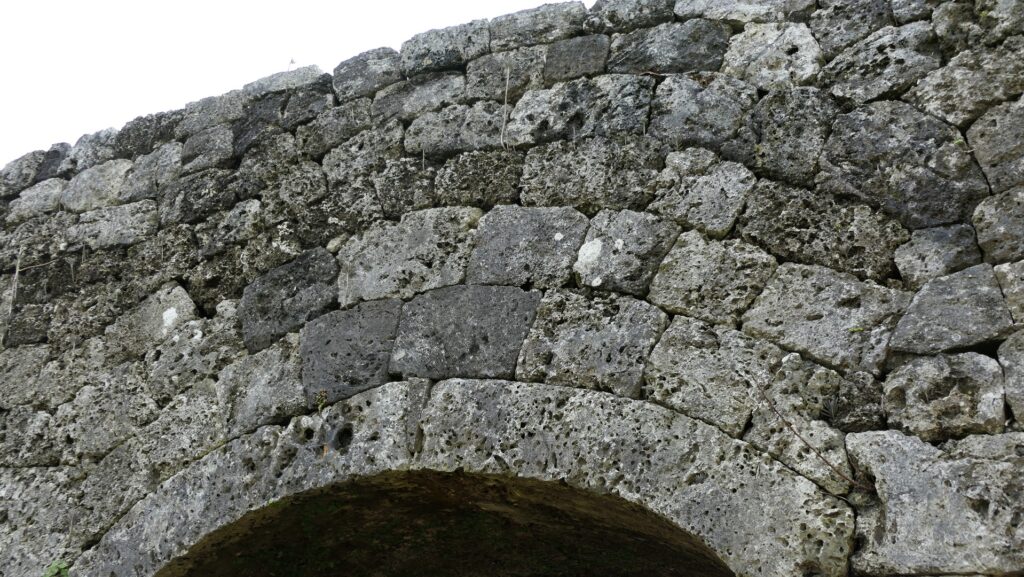
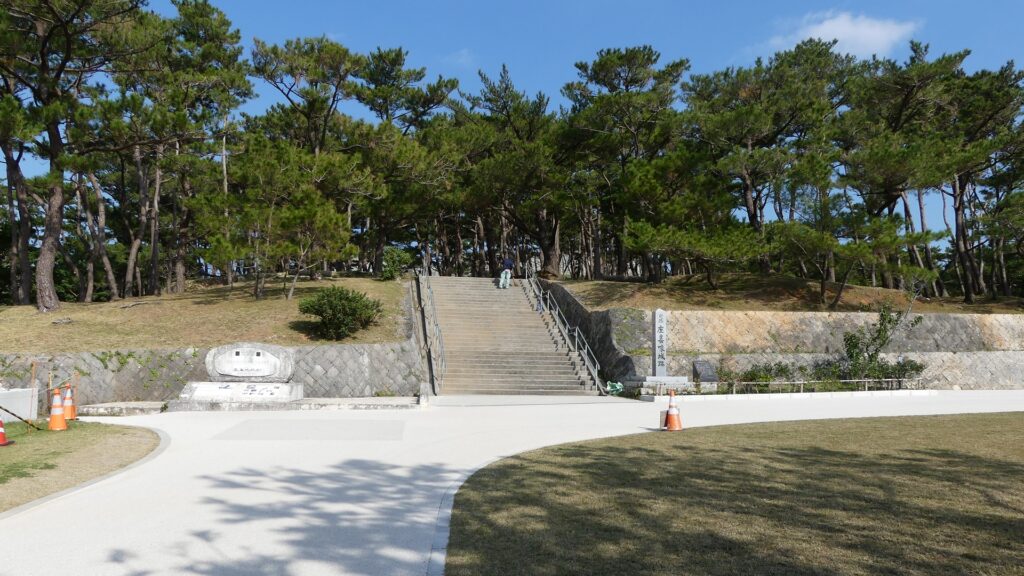
二の郭~Second Enclosure
城跡の入口に入って、石垣に囲まれた二の郭の門の方に歩いていきます。このアーチ門は現存しているもので、修復がなされました。郭に入ると、内側から美しい曲線からなる石垣が目に入ります。それから一の郭へと続く石段とアーチ型の門も見えてきます。一の郭の門は一旦破壊され、石段も埋められてしまいますが、両方とも現在では復元されています。
You can enter the entrance of the ruins and walk to the gate of the Second Enclosure, surrounded by the stone walls. Its arch shaped gate is the original and has been repaired. After entering the enclosure, you will see the beautiful curved shape of the stone walls from the inside. You can also see the stone steps to the First Enclosure and its arch shaped gate. The gate was once destroyed, and the steps were buried, but now both have been restored.
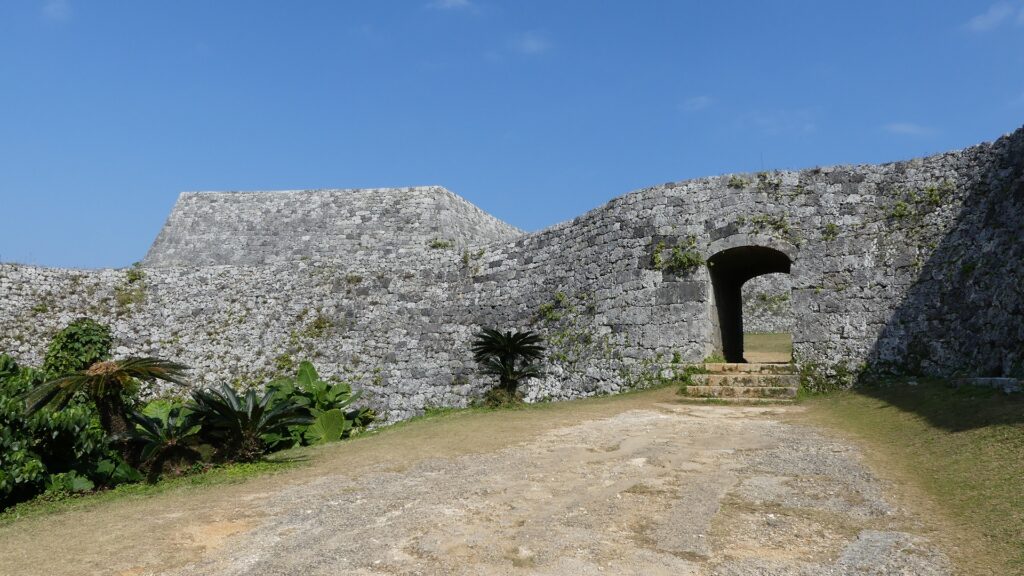
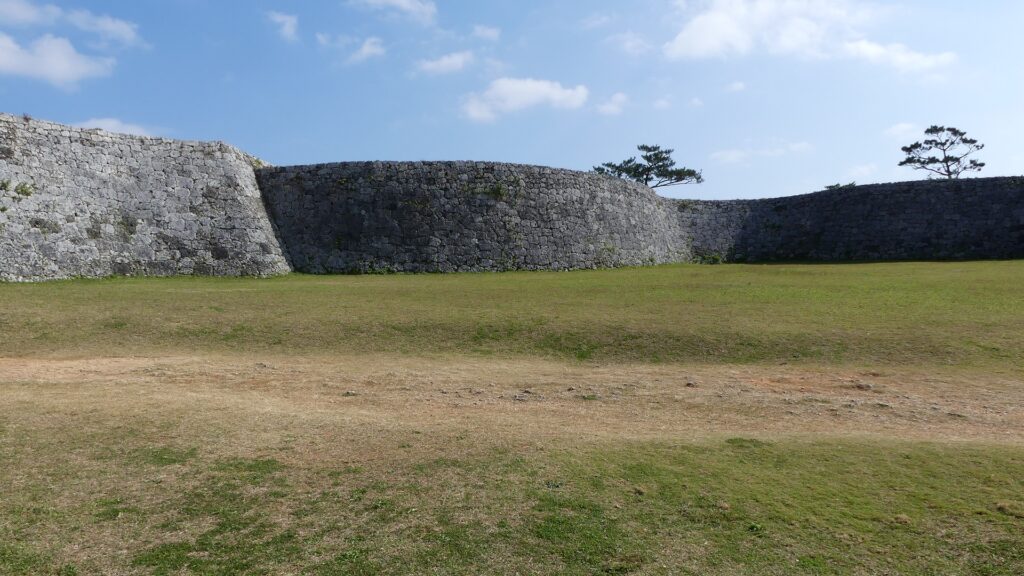
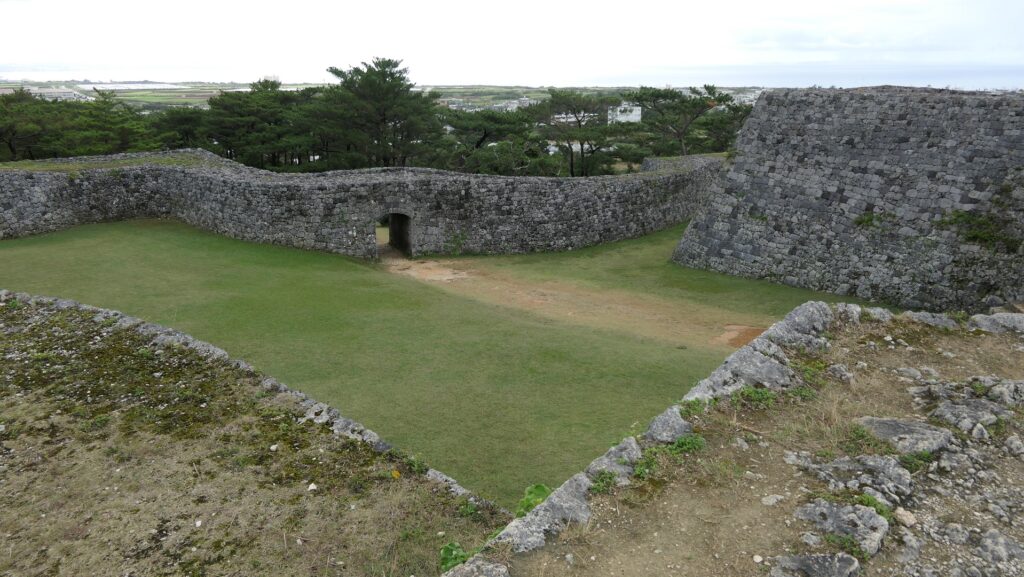
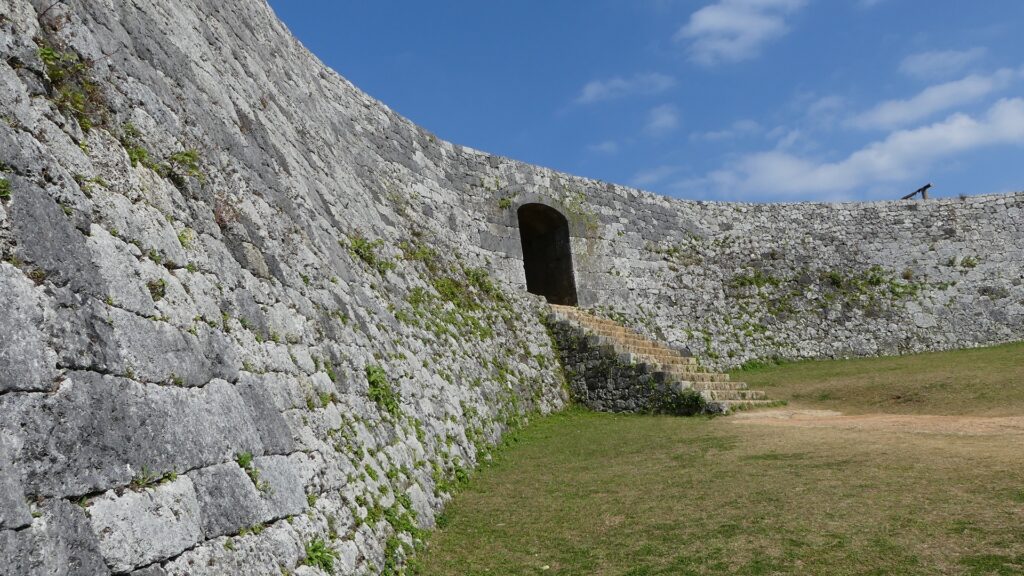
一の郭~First Enclosure
一の郭の内側は、二の郭と似た形ですが、礎石を伴った建物跡があります。もとあった建物は、瓦の破片が見つかっていないため、杮葺きか萱葺きであったようです。一部分の石垣の上には登ることができますので、東の方には島の、西の方には海の素晴らしい景色を眺めることができます。
Inside the First Enclosure, its shape is similar to the Second Enclosure. It has the ruins of buildings with cornerstones. The original buildings seemed to have a shingled or thatched roof, because pieces of roof tiles were not found. You can also go up to part of the top of the stone walls, then you will have a great view of the island on the east, and that of the sea on the west.
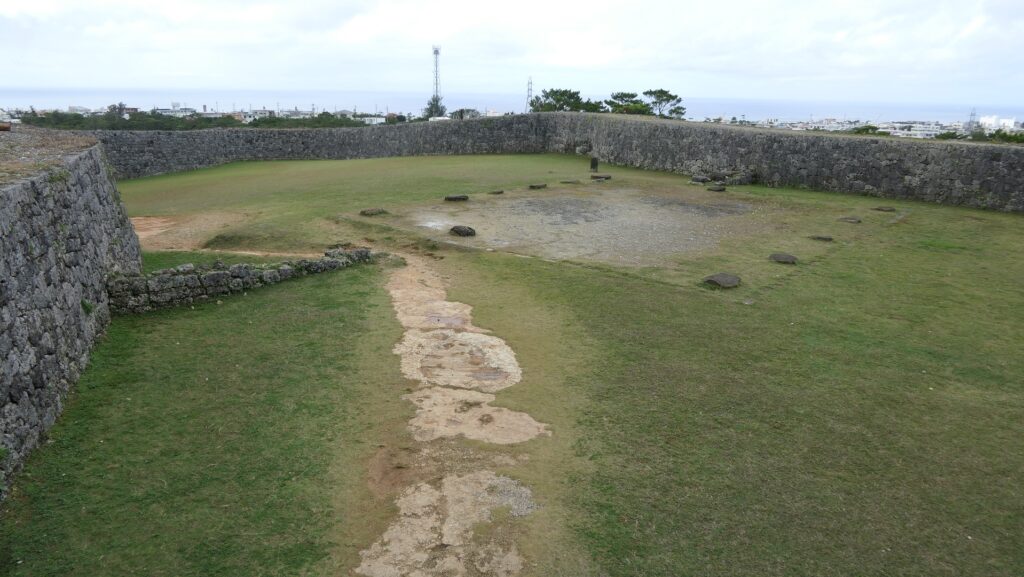
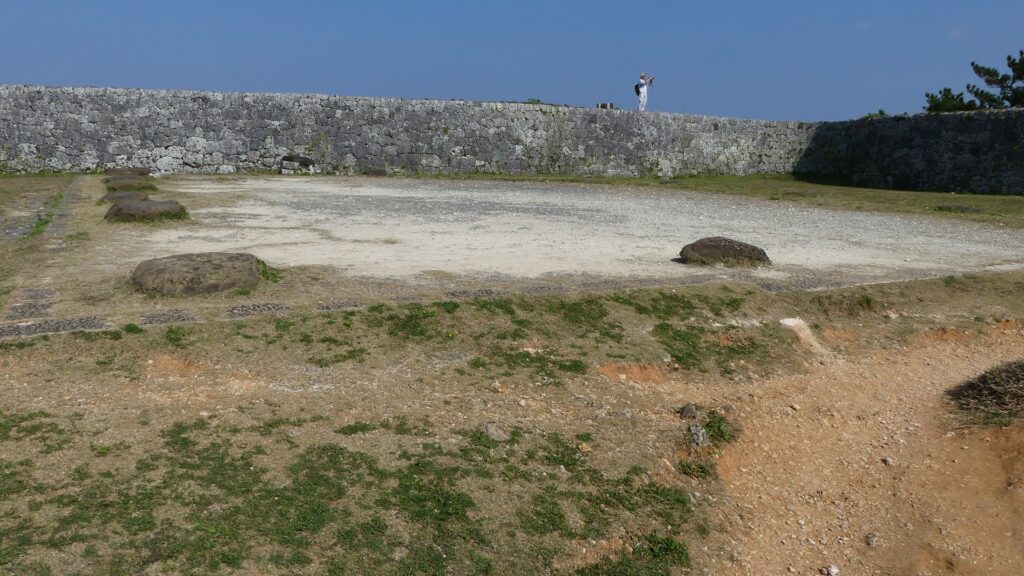
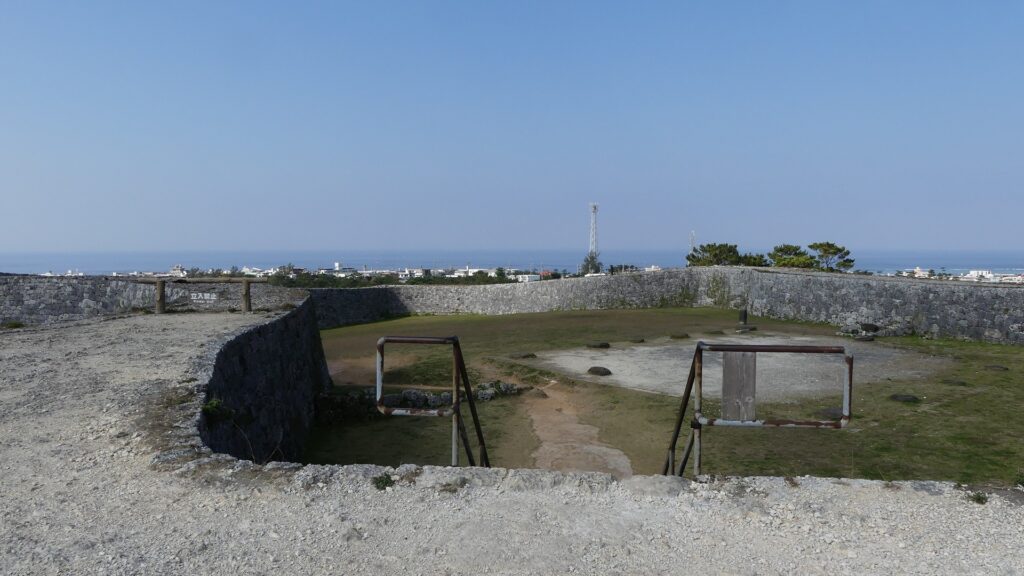
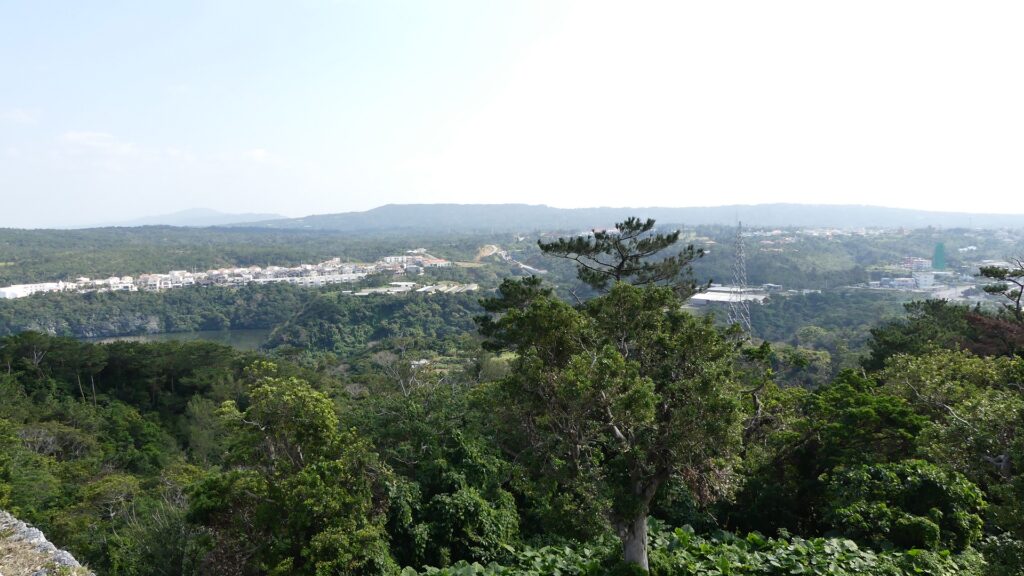
その後~Later History
座喜味城は長い間放置されてきました。第二次世界大戦の間、城跡は日本陸軍により高射砲陣地として使われていました。戦後になってさえ、米軍によってレーダー基地として再度利用されたのです。これは城跡がまだ戦略的に重要な場所にあったと言えるのかもしれません。しかし工事により遺跡の一部は破壊されてしましました。1972年の沖縄日本返還の後は、直ちに国の史跡に指定されました。ついには、2000年から琉球王国のグスク及び関連遺産群として世界遺産に登録されています。
Zakimi Castle had been abandoned for a long time. During World War II, the ruins were used by the Japanese Army as the ground for anti-aircraft guns. Even after the war, they were reused by the U.S. Military as a radar station. That might show the ruins still had a strategic location, but part of stone walls were destroyed due to the construction. The ruins were designated as a National Historic Site immediately after the reversion of Okinawa to Japan in 1972. Lastly, they have also been on the World Heritage List as Gusuku Sites and Related Properties of the Kingdom of Ryukyu since 2000.
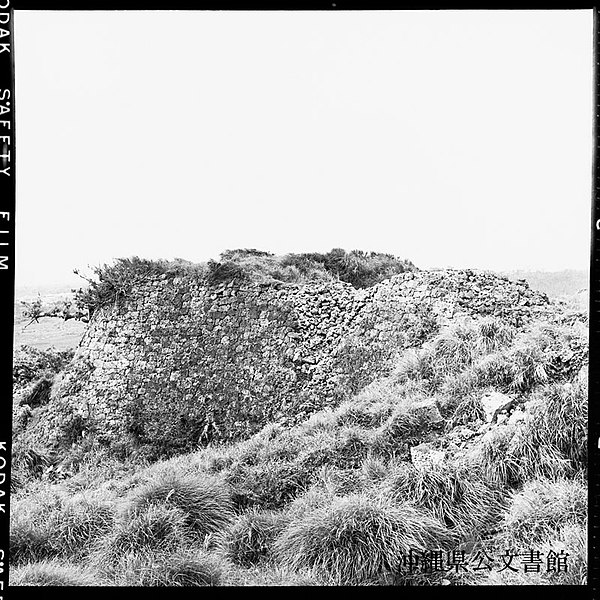
私の感想~My Impression
初めて座喜味城を訪れたとき、城の石垣が完全に復元、修復されていることに驚きを感じました。この城の美しい曲線状の姿は完ぺきに沖縄の景色にマッチしています。また、城跡のとなりにあるユンタンザミュージアムに行ってみるのもお勧めです。この城のことをもっと知るともに、周辺の地域の歴史や文化を学ぶことができます。
When I saw the ruins of Zakimi Castle for the first time, I was surprised to see the stone walls have been completely restored or repaired. Their beautiful curved appearance perfectly matches the scenery of Okinawa Island. I also recommend you to visit Yuntanza Museum next to the ruins. You can learn more about the castle as well as the history and culture of the area around the castle.
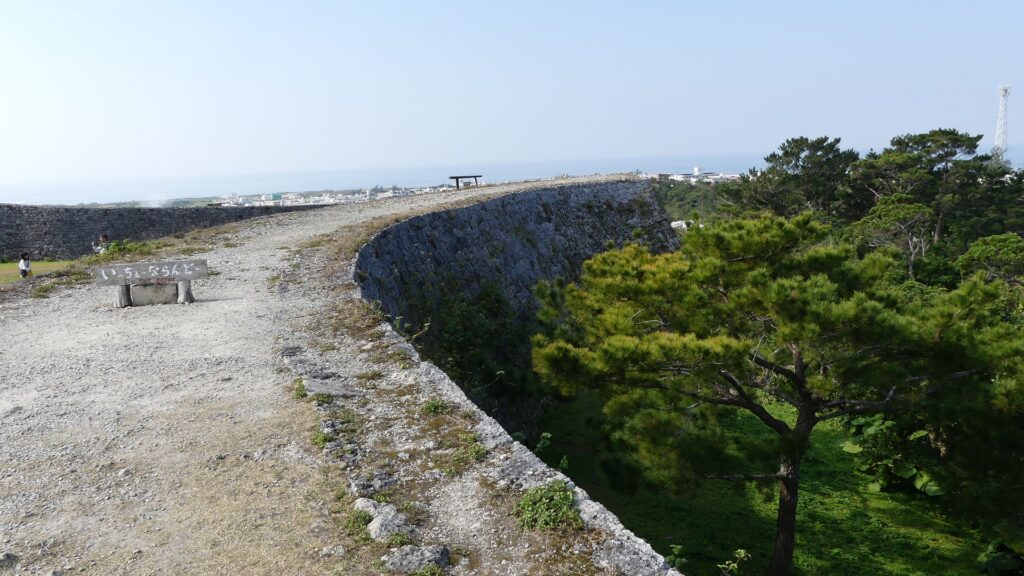
ここに行くには~How to get There
ここに行くには車がお勧めです。
那覇空港から:
車の場合、那覇空港自動車道に名嘉地ICから入り、西原JCTで沖縄自動車道に合流し、沖縄南ICで降りてください。城跡はそこから30分程かかりますが、城跡周辺に駐車場があります。
I recommend you to visit it by car.
From the Naha Airport:
By car, enter Naha Airport Expressway at the Nakachi IC, join Okinawa Expressway at the Nishihara JCT, and get off the expressway at Okihawa-minami IC. The ruins are about 30 minutes away from the IC. There are parking lots around the ruins.
リンク、参考情報~Links and References
・世界遺産座喜味城跡、ユンタンザミュージアム(Yuntanza Museum)
・萩原さちこの城さんぽ 第10回 座喜味城(Only Japanese)
・「列島縦断「幻の名城」を訪ねて/山名美和子著」集英社新書(Japanese Book)
